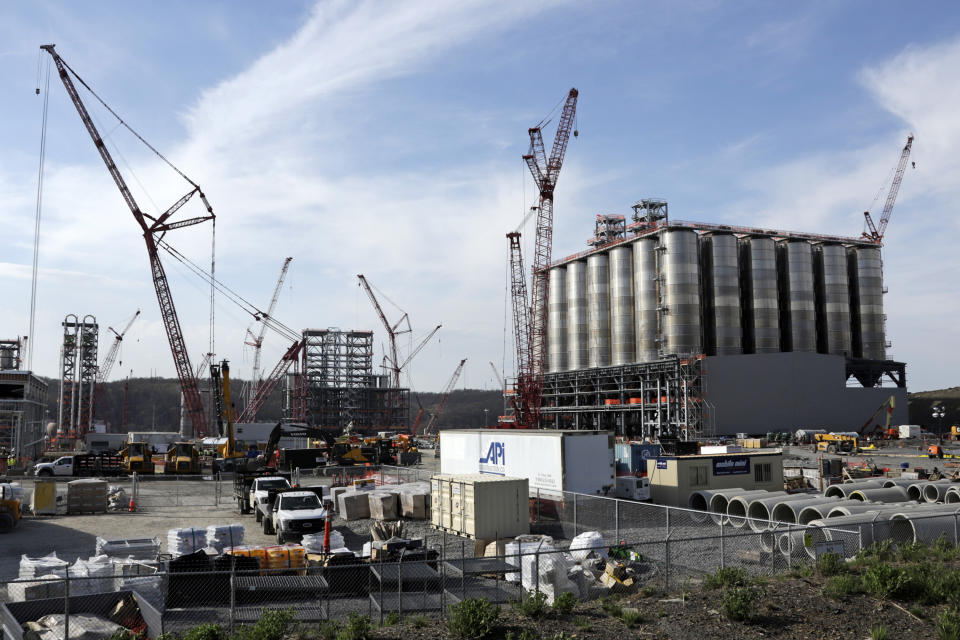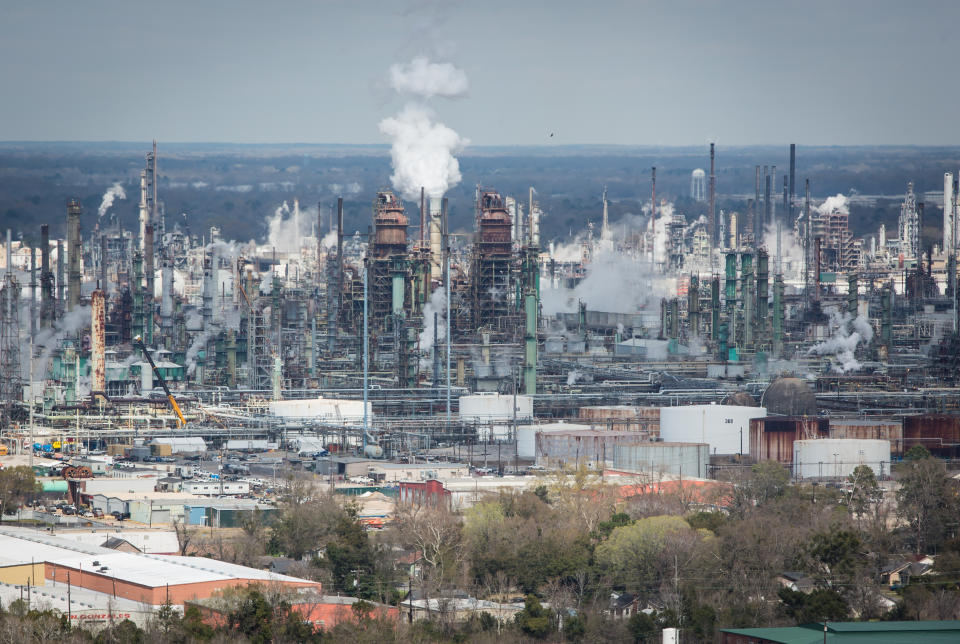Ilhan Omar pushes to protect green-energy funding from Trump
Updated 3:40 p.m.
WASHINGTON — Ilhan Omar, the first-term representative from Minnesota, is moving to stop the Trump administration from what she says is flagrant abuse of a Department of Energy loan program intended to promote renewable energy.
Specifically in her sights is the Appalachian Storage Hub, or ASH, a $10 billion project that stands to benefit from such a loan. Other energy projects supported by the Trump administration could also stand to lose out on federal loans if Congress endorses Omar’s proposal, which will be voted on this week.
The loss of ASH would be a significant blow to Trump’s promise of restoring Appalachia’s economic prospects. Comprising an enormous network of pipelines, storage caverns and manufacturing plants encompassing 500 square miles across 50 counties in West Virginia, Ohio and Pennsylvania, the program has been envisioned as a “petrochemical empire” that employs 100,000 people, according to one estimate by an industry group. That empire will involve transporting fracking byproducts called natural gas liquids from the shale plays of Pennsylvania and New York and turning them into the stuff from which everyday plastics are made.

A virtually unnoticed amendment to the House Appropriations bill introduced by Omar, however, could stop the mammoth project — and prevent the Trump administration from supporting similar initiatives in the future through the Department of Energy, currently headed by Rick Perry. During his time as Texas governor, Perry was a fracking booster, and as a member of the Trump Cabinet, he has pushed to bolster fossil fuels.
The House is expected to vote on that amendment, and others, later this week. “Rep. Omar’s amendment is an important tool to ensure that the Department of Energy fulfills its responsibility to use Title XVII loans only for the purposes Congress originally intended,” a Democratic aide on the House Appropriations Committee told Yahoo News. “The language of the amendment sends an unmistakable message that the administration must follow the law with these loan guarantees.”

ASH will be a nexus of several industries supported by Trump, and it will be built in a region critical to his political prospects next year. Critics, however, charge that the project is ill-considered, and concerns about pollution have already led some to grimly brand the Ohio River Valley, where coal’s legacy still scars the land, Cancer Valley.
The federal Department of Energy has indicated that it will give $1.9 billion in loan guarantees to complete ASH (the loan guarantee has not yet been formally agreed upon, but the process has been in the works for the last year, and has been moving forward). The expected loan will come from Title XVII, a program that began in 2005, when George W. Bush was president. It was meant to reward “innovative” technologies, but did not stipulate that those innovations had to be in the renewable sector. In his 2009 stimulus package, President Obama retooled the loan program for “rapid deployment of renewable energy,” in keeping with his plan to revive the economy after the 2008 housing and mortgage crisis by focusing on renewable sources like wind and solar energy.
Obama’s version of the program, however, ended in 2011. Officials in Trump’s department of energy believe they are acting fully within the letter of the law by funding projects that are not strictly based on renewable sources.
President Trump came into office promising to end the so-called war on coal, which is what he calls excessive regulation of the fossil fuel industry. Detractors say that it is market forces, not environmental policies, that have rendered coal increasingly unpalatable.
The move to loan $1.9 billion to a project that will bolster the fracking and plastics industry hardly fits under that description of renewable energy. Its centerpiece would be six “cracker” plants, which break apart (or crack) ethane derived from fracking. The result is polyethylene, which is used to make plastic. While the need for plastics remains high worldwide, their use and manufacture contribute significantly to global warming and pollution.
Environmental Protection Agency administrator Andrew Wheeler, a former energy lobbyist who has downplayed the ill effects of climate change, has made combating plastics pollution a priority. He has correctly noted that much of the plastic waste that ends up in the world’s oceans comes from Asia. Many of those plastics, however, are produced in the United States, which is already the world’s top ethylene producer. ASH would greatly increase the nation’s ethylene production, thus potentially worsening the problem Wheeler has vowed to solve.

In response to the potential $1.9 billion loan, Rep. Omar has offered an amendment attached to the House spending bill that would stop the Trump administration from using Title XVII loans for projects that do not significantly reduce the carbon footprint. Rep. Pramila Jayapal, D-Wash., also worked on the amendment. Her office did not respond to a request for comment.
Although the amendment mostly clarifies existing language, it does so in a way that — were the amendment to be included in the bill that Trump signs — would make it difficult for the Trump administration to use Title XVII funds for projects outside the renewable energy sector. The text of the amendment says that no Title XVII programs shall be used “for a project that does not avoid, reduce, or sequester air pollutants or anthropogenic emissions of greenhouse gases.”
But the petrochemical project in Appalachia does not appear to meet those qualifications and, in fact, would likely run counter to them, according to critics.
“It is incredibly worrisome that this administration would try to use a program designed for renewable energy to line the pockets of polluters,” Omar told Yahoo News. “We in the legislative branch have a responsibility to ensure that these grants are going to their intended recipients — and to make crystal clear that that they cannot end up in the hands of polluters. Grants that are designed for renewable energy projects should go toward renewable energy. Period.”
A staffer in Omar’s office explained to Yahoo News that while her own Minneapolis district is nowhere near Appalachia, her work on the amendment was a “natural outgrowth of the issues she cares about most — she believes we must do everything in our power to combat climate change and move to 100 percent renewable energy. So when we had the opportunity to lead this amendment, it was a natural fit.”
Since the House of Representatives is controlled by Democrats, it is expected to pass in that chamber. But from there, the appropriations bill heads to the Republican-controlled Senate, where its prospects will be more fraught.
If the amendment were entered into law before the ASH loan guarantee came through, it could imperil funding for the projects. Opponents of turning Appalachia over to the petrochemical industry cheered the development and praised Omar.
The Trump administration has also used Title XVII to make a $12 billion loan to support the construction of a nuclear power plant in Georgia. Nuclear power does not significantly emit greenhouse gases or other pollutants, though it is spurned by some renewable energy proponents for its potential dangers.
“As the Trump administration continues to recklessly promote fossil fuels in the days of climate change, to misuse a taxpayer-backed DOE loan guarantee in support of fracking and ethane storage for plastics would be the opposite of what was intended by Title XVII,” Leatra Harper of the FreshWater Accountability Project, an environmental group in eastern Ohio, told Yahoo News.
“We have no idea how anyone could consider it as legal to suggest such a misappropriation,” Harper added.

The Department of Energy did not have on-the-record comment on Omar’s amendment. But speaking about the Appalachian project more broadly, Undersecretary of Energy Mark Menezes rejected the notion that Title XVII needed any clarifying language, or that the Trump administration was somehow misusing the program.
Menezes, who as a congressional staffer helped draft the original 2005 language of the loan program, said that “these companies and individuals are very sophisticated,” and had obtained “state-of-the-art permits,” meaning that the image of waste-spewing factories was simply inapplicable to the Appalachian project.
Menezes also cast the matter in terms of plain economics. “When you talk to people down there, they’re so appreciative of the high-paying jobs,” Menzes said. The American Chemistry Council, a petrochemical lobbying group, has estimated that the project could create 100,000 jobs, but that estimate is based on a computer model that tends to exaggerate the economic benefits of projects.
Stopping the $1.9 billion loan for ASH is critical to Omar because it would serve as a template for the kinds of projects the Trump administration would support in the future. “If this project is approved, it opens the door for other projects that are also clearly not eligible under the terms of the program laid out when it was created,” Mitch Jones of Food and Water Watch, an environmental organization that worked with Omar on the amendment, told Yahoo News.
“We don’t want that precedent to be set.”
This story has been updated to clarify details of President Obama’s loan guarantee program. A previous version of this story neglected to say that that program ended in 2011. In addition, a previous version of this story included an incorrect amount for the loan to a nuclear power plant in Georgia. The correct amount is $12 billion, not $3.7 billion.
_____
Read more from Yahoo News:



